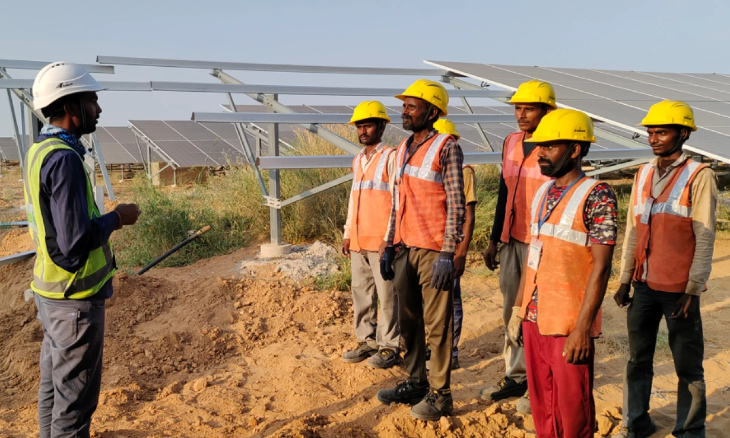
Amazon, the global e-commerce giant, has unveiled a groundbreaking 198-megawatt (MW) wind farm in Osmanabad, Maharashtra. This marks a significant milestone for Amazon, propelling them to a total of 50 wind and solar projects throughout India, amassing an impressive 1.1 gigawatts (GW) of renewable energy capacity. In the process, Amazon reaffirms its position as the world’s largest corporate buyer of renewable energy, a title they have held since 2020. Furthermore, they now stand as the foremost corporate purchaser of renewable energy in India, as confirmed by publicly-available data and Bloomberg New Energy Finance.
These Amazon wind and solar ventures have proven to be transformative for India’s communities, attracting an estimated $349 million (Rs 2,885 crore) in economic investment between 2014 and 2022. These projects have also injected around $87 million (Rs 719 crore) into India’s gross domestic product (GDP) and provided vital support to over 20,600 local full-time equivalent jobs in 2022 alone, according to an innovative economic model developed by Amazon.
Abhinav Singh, Vice President of Operations at Amazon India, underlines the significance of rapidly expanding renewable energy, particularly in India, which is diligently working to transition away from fossil fuels. He emphasized that these endeavors will play a pivotal role in Amazon’s goal to power its operations with 100 per cent renewable energy by 2025, while simultaneously fostering job creation and economic prosperity within local communities. Singh stated, “We’re eager to continue contributing to India’s economic and environmental goals as part of Amazon’s commitment to become a more sustainable business.”
Shri Dinesh Dayanand Jagdale, Joint Secretary of The Ministry of New and Renewable Energy, Government of India, also hailed Amazon’s renewable energy investments, as they inspire other corporations to embrace renewable energy in India. This aligns with India’s ambitious target to achieve 50 per cent capacity from renewable sources and its status as a leading solar module manufacturer and wind energy ecosystem builder.
Amazon’s Osmanabad wind farm is the seventh utility-scale renewable energy project announced in India within the past year, complemented by 43 rooftop solar projects that power local Amazon facilities. Once all 50 projects are operational, they are poised to generate an amount of energy equivalent to powering over 1.1 million homes in New Delhi each year. Additionally, they will provide clean energy to Amazon’s data centers, logistics facilities, physical stores, and corporate offices.
Over the years, Amazon has worked closely with policymakers, regulators, and industry stakeholders to enhance corporate renewable energy procurement options in India, facilitating the launch of these new projects and enabling others to expand their renewable energy initiatives.
Amazon’s collaboration with ReNew, developer of the Amazon Solar Farm India–Rajasthan Jaisalmer, stands as a prime example of the positive impact. The solar plant’s development has brought economic growth to the area, including a stable income source for residents, improved educational opportunities for children, and a boost to local businesses. Awadhesh Kumar, a senior engineer at Amazon Solar Farm India–Rajasthan Jaisalmer, is inspired by the broader purpose of the work. He noted, “We are at the forefront of tackling climate change. Each day, I strive to do better, because I know that my work is making a real difference in the world.”
In June, Amazon CEO Andy Jassy committed to invest $26 billion (Rs 2,14,942 crore) in India by 2030, with AWS contributing $12.7 billion (Rs 1,05,600 crore) to cloud infrastructure. AWS’s cloud infrastructure, with regions in Mumbai and Hyderabad, allows Indian customers to reduce their IT workload carbon footprint by up to 96 per cent once AWS transitions to 100 per cent renewable energy globally by 2025.
AWS tools and solutions are also empowering other Indian companies, such as Greenko Group, a renewable energy solution provider, to monitor their renewable energy operations effectively using advanced technologies like AI, ML, IoT, and data analytics.
As part of The Climate Pledge, Amazon is steadfast in its commitment to achieving net-zero carbon by 2040, with over 400 signatories worldwide, including nine Indian companies. The company is also revolutionizing its transportation network by electrifying its delivery fleet in India, comprising more than 6,000 electric vehicles serving over 400 local cities.
Furthermore, Amazon is investing $15 million in nature-based projects in the Asia-Pacific (APAC) region to bolster climate resilience and biodiversity. The initial $3 million of this fund’s APAC allocation will support projects in India, commencing with a venture in the Western Ghats to plant 300,000 trees, creating carbon sinks and enhancing wildlife conservation and livelihoods.

